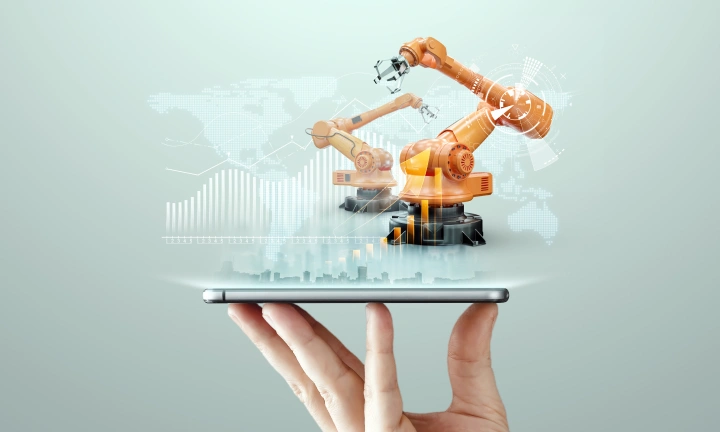Robotic Process Automation (RPA) is a cutting-edge software technology that enables the creation, deployment, and efficient management of virtual robots designed to mimic human interactions with digital systems and software. These software robots can interpret on-screen content, execute precise keystrokes, traverse complex software interfaces, recognize and extract valuable data, and carry out a diverse range of predefined tasks. What sets RPA apart is its innate capacity to perform these actions swiftly and consistently, without the need for breaks, ensuring uninterrupted productivity. RPA machine learning becomes a potent tool for automating complex tasks when coupled with machine learning. At the same time, in the realm of data, RPA serves as a game-changer by streamlining data processing, validation, and transformation.
Applications of RPA span across various domains, including finance, healthcare, customer service, and logistics, where it revolutionizes business processes by reducing human intervention, minimizing errors, and enhancing operational efficiency. By integrating RPA machine learning, RPA can adapt and make intelligent decisions, elevating its potential in data-driven industries. RPA data management is a crucial player in today’s digital world, where it can collect, clean, and analyze data with unmatched accuracy and speed, making it an indispensable asset for organizations in the age of digital transformation.
What are the Business Benefits of RPA
Robotic Process Automation services offer many significant business benefits. Its several applications streamline workflows, increase profitability, enhance flexibility, and improve organizational responsiveness. Moreover, by automating routine and repetitive tasks, RPA boosts employee satisfaction and elevates engagement and productivity, as employees can focus on more value-added activities. The applications of RPA across various domains make it a valuable tool for businesses looking to optimize their operations and stay competitive in the digital age.
RPA’s noninvasive nature and proficiency in handling RPA data allow for swift implementation, a key advantage in accelerating digital transformation initiatives. This technology is highly adaptable and excels at automating processes that involve legacy systems without APIs, virtual desktop infrastructures (VDIs), or limited database access. This adaptability and efficiency make RPA ideal for businesses seeking to enhance operational efficiency and embrace automation in a rapidly evolving digital landscape. The application of RPA plays a pivotal role in enabling seamless and efficient transitions when seeking to transform into a highly automated and digitally optimized organization.
- 63% of global executives recognize RPA as a significant driver in digital transformation companies, highlighting its pivotal role in rapidly evolving business landscapes.
- A majority of 57% acknowledge that the application of RPA significantly reduces manual errors, ensuring data accuracy and process reliability.
- RPA is considered highly effective in meeting or exceeding expectations for better compliance, with 92% agreeing.
- 60% of executives concur that RPA enables employees to focus on more strategic and value-added tasks, optimizing workforce capabilities.
- RPA contributes to increased employee engagement, as noted by 57% of executives, promoting a more positive work environment and job satisfaction.
Top 8 Applications and Use Cases of Robotic Process Automation
Banking and Financial Services
In Banking and Financial Services, RPA machine learning and data management have become instrumental. Banks and financial institutions harness the power of RPA to automate critical tasks such as account opening, loan origination, and ensuring compliance with KYC regulations. Furthermore, RPA is a valuable tool for processing financial transactions swiftly and accurately while also facilitating the reconciliation of accounts.
Healthcare
The healthcare sector can significantly benefit from implementing RPA machine learning across multiple dimensions. Healthcare is fundamentally centered on patient care, but the crucial administrative tasks that underpin its operations play a pivotal role. Various facets of healthcare operations, encompassing front-office tasks and processing payments, can be automated through RPA machine learning, enhancing efficiency.
Supply Chain and Logistics
The application of RPA offers the potential to streamline various critical functions within this sector. RPA can be effectively employed to automate multiple tasks, including but not limited to order processing, inventory management, and shipping operations. Furthermore, RPA can be harnessed for real-time tracking and monitoring of supply chain data, ensuring greater efficiency and visibility throughout logistics.
Retail
In the retail industry, the strategic deployment of RPA holds immense potential for optimizing various vital operations. It is a valuable tool to automate essential tasks, encompassing order processing, inventory management, and facilitating shipping processes. Moreover, it can play a pivotal role in the real-time monitoring and tracking of supply chain data, enhancing visibility and efficiency while harnessing the power of data-driven insights through RPA data.
Human Resources
Leveraging RPA in HR functions offers a range of applications. RPA, with Machine learning, can automate tasks like candidate screening, onboarding, and employee benefits enrollment, making these processes more efficient and error-free. It can extract valuable data from resumes to automatically populate candidate profiles, enhancing talent acquisition with data-driven insights through RPA data.
Telecommunications
RPA applications with machine learning in the telecommunications industry offer significant advantages. It can be deployed to automate tasks such as order processing and billing, streamlining these critical operations. RPA can be harnessed to extract essential data from customer call logs and efficiently populate customer profiles, optimizing customer relationship management with data-driven insights.
Manufacturing
The application of RPA within the manufacturing sector presents valuable applications. RPA, enhanced by machine learning, can automate inventory management, production scheduling, and quality control tasks. It can be leveraged to extract data from production logs, enabling real-time production efficiency monitoring while harnessing the power of data-driven insights through RPA data.
Insurance
In insurance, using RPA applications enriched by machine learning offers substantial benefits. RPA can streamline critical tasks like policy underwriting, claims processing, and policy renewals, enhancing operational efficiency. RPA data can extract pertinent data from policy documents, facilitating the automatic population of customer profiles and providing data-driven insights to improve customer service and decision-making.
Conclusion
RPA offers a versatile automation solution applicable across diverse industries to improve customer service and experience. When contemplating the integration of RPA into your business, it’s crucial to identify an RPA solution tailored to your distinct needs and prerequisites. With the appropriate RPA system, you can revolutionize your business and propel it to new heights. Accely can be your reliable business transformation partner, accompanying you on your journey toward growth and success. Connect with us at [email protected] to know more.





